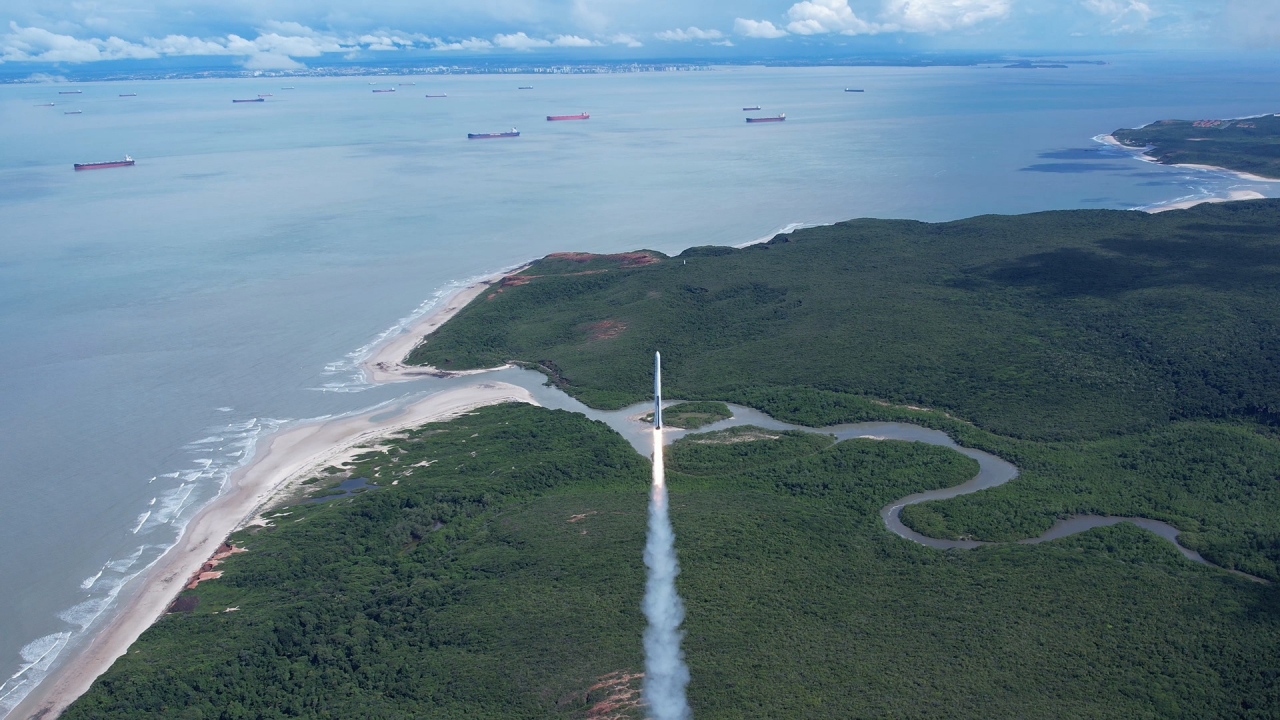 |
Innospace hybrid rocket Hanbit-TLV flies into the air after being launched from the Alcantara Space Center in Brazil on Sunday. (Innospace) |
Innospace, a South Korean startup specializing in developing hybrid space rockets, on Tuesday announced that the previous day's launch of the Hanbit-TLV had been successful, opening up a new era for the country’s private space sector.
The Hanbit-TLV, which was launched from the Alcantara Space Center in Brazil at 2:52 p.m. on Sunday there, flew for 4 minutes and 33 seconds with its engine burning for 106 seconds after the liftoff, and eventually landed in the safety zone in Brazilian waters, according to the company.
Innospace’s milestone marked the first successful launch of a space launch vehicle in the Korean private sector. According to the company, it also demonstrated the world’s first successful launch of a hybrid rocket using an electric pump, taking the lead among global competitors.
“We had to try four times due to unexpected events in the launching process and there were many difficulties in the preparation. But I believe that we took the first step for commercializing launch vehicles,” said Kim Soo-jong, CEO of Innospace, in a videoconference with reporters.
The original launch, which was scheduled for March 8, had to be pushed back due to a frozen battery issue. The window of the launch period was soon closing, however, as the last possible launch date was set for March 21. The company had to postpone its first launch attempt in December last year due to a weather issue, problems with a cooling valve and connection errors between systems.
Although the targeted time for the engine burning was 118 seconds, Kim explained that the hybrid engine’s function was fully performed as it used all of its solid fuel and liquid oxidizer. The 12-second difference occurred due to the hot and humid weather in Brazil, according to the CEO.
The suborbital launch vehicle carried the Brazilian military’s inertial navigation system -- called SISNAV -- which weighs 20 kilograms. Because of contract issues with the Brazilian military, Kim said he could not specifically mention whether the Hanbit-TLV reached its targeted altitude of 80 kilometers.
“If you watch the video footage of the camera loaded on the launch vehicle, I think you could tell that it reached a pretty high altitude,” said Kim, hinting that the launch had met its target.
The launch was a test to verify the performance of the 15-ton hybrid rocket engine, which will be used as the first-stage engine of the Hanbit-Nano rocket later. Innospace is currently developing the Hanbit-Nano, which will be capable of putting a 50-kilogram payload into a 500-kilometer low-Earth orbit, with an aim to begin commercial services for launching small satellites in 2024.
The company plans to develop bigger and more powerful hybrid rockets -- the Hanbit-Micro and Hanbit-Mini -- that can carry payloads weighing 150 kilograms and 500 kilograms, respectively.
Having secured the Brazilian launch site, Kim said the company will try to finalize a contract with the Andoya Space Center in Norway before the end of this year for a launching foothold in Europe.
Korea at the moment has one launch site at the Naro Space Center in Goheung, South Jeolla Province. It was used for the government-led launch of the homemade Nuri rocket in June last year. The government in January began a preliminary feasibility review of building a launch site for the private sector.
Established by the current CEO in 2017, the startup has raised 55.2 billion won ($42 million) in investment funding. The rocket developer plans to go public on Korea’s secondary tech-heavy Kosdaq in 2024 to draw in more funding for additional research and development.
“In order for us to break even and secure self-sustainability, we need to conduct 35 launches in 2026. That means we will need to carry out one launch at the three launch sites in Brazil, Norway and Korea per month,” said Kim.
The CEO told The Korea Herald in an interview last month that the company aims to secure a launch site in the US to have operational footholds in continents with demand for commercial satellite launching services.
Minister of Science and ICT Lee Jong-ho released a message of congratulations to the startup, underscoring what Innospace's successful launch means for the growth of the country’s space industry. Lee said the ministry will accelerate commercialization of private launch services with support policies such as creating private demand with public satellites and establishing an approval system for private launches.






![[Today’s K-pop] Blackpink’s Jennie, Lisa invited to Coachella as solo acts](http://res.heraldm.com/phpwas/restmb_idxmake.php?idx=644&simg=/content/image/2024/11/21/20241121050099_0.jpg)
